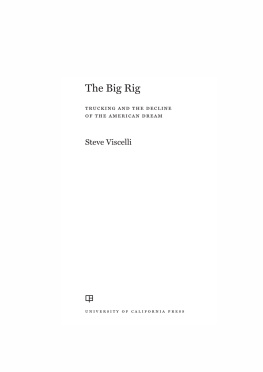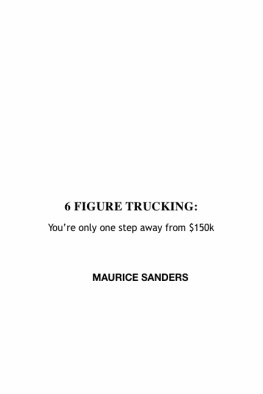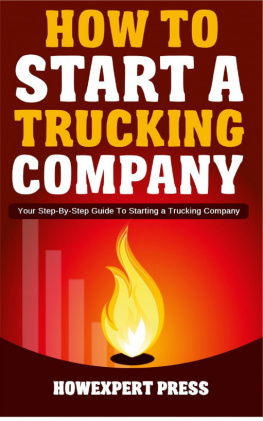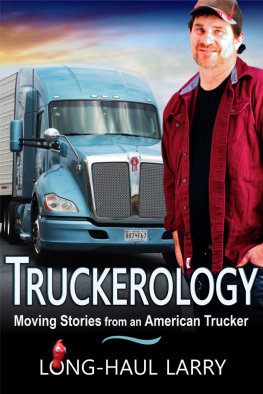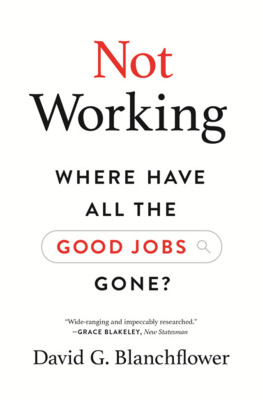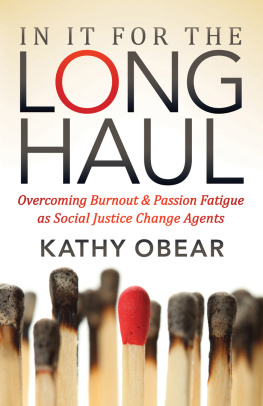EBSCOhost - printed on 3/28/2022 2:45 PM via . All use subject to https://www.ebsco.com/terms-of-use
Preface
The sociologist C. Wright Mills (1959) argued that sociology is valuable because it helps us to understand the relationships between the individual and society and between biography and history. The sociological imagination, Mills claimed, allows us to see how the beliefs, decisions, and actions of individuals are shaped byand then in turn reproduce or changeour social world. The sociological imagination explains how society changes by examining the changing nature of these relationships over time. And, when needed, it is the sociological imagination that allows us to understand personal troubles in a way that can reveal underlying social problems. This book applies the sociological imagination to the trucking industry, one of the largest and most vital industries in the United States. It thus moves back and forth from examining the details of the actual work of truckers and how they think about it to looking at the larger historical transformation of class power in the trucking industry, and then attempting to explain the relationships that connect these two realms. The book covers both the micro and the macro, from individual ambitions, fears, economic opportunities, constraints, and decisions that truckers told me about, to the rise and fall of worker power, the onset, retreat, and reformulation of state regulation, and the transformation of employment relations and the work of moving freight itself.
This book is the outcome of ten years of research. I began by reading a few books on the trucking industry. I then took a job as a long-haul driver, immersing myself in the daily routines, goals, and difficulties of the work for almost six months. Though I ended my career as little more than a rookie, I came to understand personally the sense of pride truckers feel in their skills and the care they take to ensure safety despite the enormous demands of their work. I also came to understand the kinds of sacrifices they make and the indignities they suffer. I then looked at the bigger picture of labor markets. I interviewed drivers with experiences both similar to and different from my own. Many were new to the industry and figuring it out just like me. Others, with a little more experience, were wrestling with the question of whether to buy or lease a truck and become an owner-operator (i.e., an independent contractor). However critical this book may be of independent contracting across much of the trucking industry, I came to deeply respect the ambitions and efforts of many of the drivers who choose to become independent contractors. Unfortunately, I also came to agree with the most experienced truckers I interviewed, that the dreams of these less-experienced drivers were played upon by employers and others who have rigged independent contracting to their advantage.
Are there any opportunities for drivers to be independent contractors that arent bad? Ill let the voices of the most experienced drivers, including the most experienced contractors, answer that question in the pages that follow. In fact, drivers with the most experience often pointed me in the direction of the bigger structural and historical issues at play. Much of what value may be contained in this book resulted from me trying to understand in sociological terms the insights shared by these truckers. On many points I have been a research assistant to them.
I have benefited from conversations with hundreds of truckers and others working in or studying the industry. At every step in the process of writing this book, I have had those people mind. The most basic goal that has guided me throughout is the desire that all those individuals, especially the drivers, would agree that I have accurately represented their experience. At my most hopeful I have imagined my most experienced interviewees reading this book and concluding that not only did I get it right as they see it, but that by putting their experiences together with those of other drivers, the perspectives of carrier managers and owners, and in the context of statistics and historical facts, they can now understand their own experiences in a new way. Even more importantly, I hope that this book may allow the knowledge and advice of those veteran insiders (for better and worse organized and narrated by a sociologist) to be passed on to those new to the industry.
Relative to the academic literature, my goal is to draw the readers attention to the critical links between ideology, discourse, state policy, and individual workplaces, as well as the decisions of workers as they invest in their work lives. Its there, in that interaction, that we find the labor market, a woefully understudied arena of class power and class action. It is at the level of the labor market that key parts of the disturbing story of rising inequality and bad jobs in the United States need to be investigated.
For readers interested in public policy my goal is to show why the transformation of employment relations in trucking that produced the troubles of the drivers described in this book should be understood as a pressing issue to be addressed, regardless of whether their ultimate concern is workers and their families, highway safety, traffic congestion, economic efficiency, the social safety net, or environmental sustainability. Indeed, the story told in this book is important to all of us as consumers, workers, the motoring public, taxpayers, and citizens. The workplace of truckers is a public space that we share with them as they follow the laws of the road, comply with the direction of employers, and meet the demands of customers. While the public may see truckers primarily as a problem or a danger, the importance of the work they do and how it is regulated by government cannot be overstated. It is their work that moves our economy, bringing us the goods that sustain and entertain us, whether those goods come from a hundred miles away or halfway around the world. How truckers are trained, how they work, how they are treated by their employers, and what social safety net programs they have access tothese issues affect all of us.

